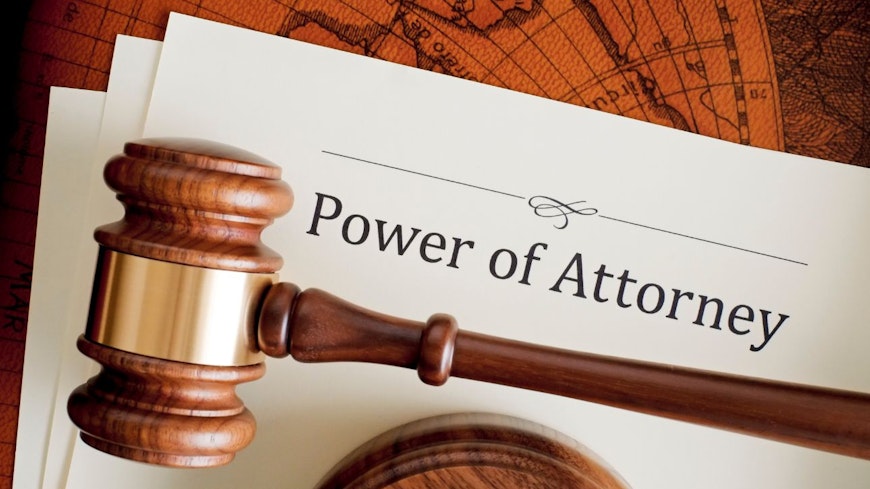If you lose the capacity to handle your own affairs, you’ll need someone to do it on your behalf. However, this will need to be arranged in advance. We explain what a power of attorney is, how to set one up and what to look out for if you become an attorney for someone else.

What is a ‘power of attorney’?
A power of attorney is a legal document that enables you, the “donor”, to give authority to someone else, the “attorney”, to act on your behalf. It lets others make important decisions for you.
Why use it?
If something happens to you and you are unable or unwilling to make decisions about yourself, someone will need to make decisions for you. If you don’t have a power of attorney set up, your family will have to apply to the Family Court to be given the power to act on your behalf. This can take time and be costly.
Having a power of attorney set up in advance can help your loved ones avoid stress and make decisions as soon as something happens. It needs to be set up while your mental capacity and judgement still allow you to understand what you’re doing.
Types of power
There are two broad types of powers: “ordinary” and “enduring”.
Ordinary powers are best used for temporary purposes – for example, if you’re going overseas and want someone to be able to send you cash from your accounts or to pay bills at home. If you lose legal capacity, an ordinary power of attorney ends.
An enduring power of attorney (or EPA) is used for longer term protection and doesn’t stop when you lose legal capacity. There are two types of EPA – an EPA for property and financial assets and an EPA for personal care and welfare. You can appoint the same attorney to act in relation to both property and care and welfare, or you can appoint different people.
Revoking a power of attorney
You can vary, suspend or revoke a power of attorney while you’re still mentally capable. There are different procedures for each of these actions. We recommend you get legal advice, especially when revoking a power of attorney.
EPA for property and financial assets
A property and financial assets EPA will come into effect when you become mentally incapable of making decisions, or at a time of your choice (for example, if you move into assisted living and would like someone else to oversee the sale of your house).
You are “mentally incapable” in relation to property when you are not wholly competent to manage your own affairs. Some lawyers recommend the EPA have immediate effect because of the costs and difficulties of proving lack of capacity.
Depending on the wording of the EPA, an attorney who deals with your property can access your bank account, pay your bills, roll over your term deposits and even sell your home and other property.
You can appoint more than one attorney or use a trustee company such as Public Trust.
Reducing problems
There are measures you can take to protect yourself and reduce the risk of problems arising.
Appoint two attorneys – attorney appointments can be made “joint” or
“several”. “Joint” attorneys must make decisions together and cannot
act without the knowledge and approval of the other. The problem with
joint appointments is that if one attorney is out of contact or
incapacitated, the other can’t act alone. The EPA will cease to have
effect if one of the attorneys dies and the court revokes the
appointment, or if one attorney becomes bankrupt or mentally ill.
There will also be a problem if the joint attorneys can’t work
together. “Several” attorneys can make decisions separately.Appoint a professional or a trustee company – an institution will be
independent and will provide a check on an individual attorney.
However, there will be ongoing professional costs for the work done.Restrict an attorney’s powers – instead of giving an attorney full
power, you can limit what they can do. For example, you can choose to
give your attorney power to access your accounts but not sell your
house. But don’t go overboard with this. Having an attorney hamstrung
with countless restrictions while you’re unable to look after
yourself could be as bad as having no attorney at all.Require consultation – you can also name parties with whom the
attorney must consult before making decisions. The final decision
still lies with the attorney, but the requirement for consultation
can provide reassurance that the right decision will be made.
EPA for personal care and welfare
A personal care and welfare EPA will come into effect if you no longer have capacity to make decisions.
Only a private individual (not a trustee company) can act as an attorney for personal care and welfare. If you have chosen two different attorneys, your personal care and welfare attorney will have no control over your money, so must consult and work closely with the attorney for property. It’s important to select attorneys who can communicate and work well together.
An attorney for personal care and welfare can’t act in relation to a significant matter unless a relevant health practitioner has certified, or the court has determined, that you are mentally incapable. You will be considered mentally incapable when you lack the capacity to make or understand decisions in relation to your personal health and welfare.
The attorney also can’t act in relation to other matters unless they believe on reasonable grounds that the donor is mentally incapable.
You may want to limit your attorney’s authority over matters such as moving in to rest-home care. But you need to ensure the attorney has enough flexibility to deal with situations that you might not envisage. If the authority is too prescriptive, their ability to deal with changing circumstances could be undermined.
You can also name parties with whom the attorney must consult before making decisions.
The personal care and welfare attorney can’t make decisions about marriage or divorce, or electro-convulsive treatment, or refuse to consent to life-saving medical treatment.

We know your rights
Got a problem with a faulty product, received shoddy service or been misled by a retailer? Our expert advisers can provide clear, practical advice that you can trust.
Appointing an attorney
You can choose anyone as your attorney, but ensure it is someone you trust that has the time and skills to deal with your affairs. The should also have your best interests at heart. An attorney must also:
be at least 20 years old
not be bankrupt
not be subject to any personal or property Family Court orders
not be mentally incapable themselves
People often choose their partner as attorney, especially for personal care and welfare. If you are single, choose a trusted relative, friend, solicitor or accountant who is healthy and likely to outlive you, or a trustee corporation. A trustee corporation can be your attorney for property but not for personal care and welfare. Professionals will charge for their services, typically on an hourly basis for work done.
Once you’ve appointed an attorney, avoid later misunderstandings by making sure that close friends and family members know.
Documentation
Standard forms must be used for granting EPAs. You can get these forms from the Office for Seniors website and from lawyers and trustee companies.
Witnessing the document
Your signature must be witnessed by one of:
a lawyer
an authorised officer of a trustee corporation
a registered legal executive who has at least 12 months’ experience and is employed by a lawyer.
A “certificate of witness” to your signature must be attached to the form. The certificate confirms that certain matters have been explained to you before you signed, that the witness is independent of the attorney and that the witness has no reason to suspect you are mentally incapable.
Fees
Some law firms may be willing to prepare an EPA for free if you’re doing other business with them. But in most cases, you’ll have to pay. You should be able to speed up the process and cut down on costs by doing the groundwork before you seek advice.
If you use a trustee company to prepare an EPA, charges start from around $150 to $290 depending on the company. If you use a lawyer, fees will usually be based on an hourly rate or a task-based rate.
Before you go ahead, ask what the fees are likely to be. Lawyers must provide you with information in advance about their charges. Some community law centres may prepare EPAs for a small charge. Check with your nearest centre.
Being an attorney
If you are appointed as an attorney, your responsibilities will depend on the type of EPA and instructions that have been included in it. However, there are some key obligations you must meet.
Act in the donor’s best interests
Property – you must use the donor’s property to promote and protect
their best interests and encourage them to develop the competence to
manage their own property affairs. You must keep records of each
financial transaction that you enter into under the EPA while the
donor is mentally incapable. Failure to do so is an offence which can
be prosecuted and fined.Personal care and welfare – you must promote and protect the welfare
and best interests of the donor. You need to encourage them to
understand decisions relating to their care and welfare and encourage
them to act on their own behalf wherever possible. You must also help
them integrate into the community – for example, by contacting
organisations that provide support and recreational activities.
Duty to consult
You must, as far as is practicable, consult both the donor and any person who has been specified in the EPA. An attorney for property should always consult with the donor unless there is a medical reason preventing their understanding.
If separate attorneys are appointed for property and care and welfare, both attorneys must consult regularly to ensure the donor’s interests are not prejudiced through any breakdown in communication between them. The property attorney must give the personal care and welfare attorney any financial support required to carry out their duties. The care and welfare attorney must consider the financial implications of any decision in respect of the donor’s property.
Provide information on exercise of powers
You must provide information when requested if the person making the request is a lawyer appointed by the Family Court or is specified in the EPA.
Attorney’s power to benefit
While a donor is “mentally incapable”, an attorney can only act to benefit the donor unless otherwise provided for or authorised by the Family Court. When creating the power of attorney, a donor can specify provisions for when an attorney can benefit themselves or others. They may, for example, wish to authorise the attorney to assist a child with a particular problem.
The attorney can recover any out-of-pocket expenses reasonably incurred and professional fees. Receipts or other reasonable evidence must be provided.
Family Court
The Family Court has broad powers to monitor the performance of an attorney, vary the terms of the arrangement and, if necessary, revoke the authority.
The Family Court can also review any decision made by an attorney while the donor is mentally incapable. It can review a decision by taking such actions as examining account and transaction records.
The Family Court can revoke an appointment of an attorney if it is satisfied:
an attorney is not acting in the best interests of the donor
an attorney is failing to comply with certain obligations
the donor of an EPA was induced by undue influence or fraud to create the power.
The court will not automatically monitor the performance of an attorney; it must first receive an application for review. An application can come from a range of people including a relative, medical practitioner or anyone the court gives leave to do so. It’s free to ask the court to look into the performance of an attorney.

We can't do this without you.
As an independent non-profit, we depend on the generous support of our members and donors to keep us fighting for a better deal.

Know your consumer rights
Got a problem with a product you bought? Or maybe your flight has been delayed or cancelled? Whatever the problem, we can help.


